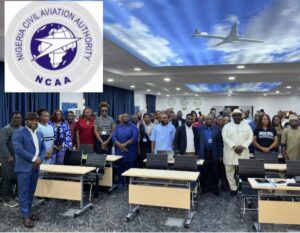
BY OLAPEJU OLUBI
The Nigeria Civil Aviation Authority (NCAA) is on the brink of a transformative shift, announcing plans to fully digitise its operations in a move poised to redefine the nation’s aviation regulatory landscape.
This landmark initiative aims to streamline the authority’s processes, enhance oversight efficiency and ensure that the Nigerian aviation sector remains competitive and responsive to modern demands.
At the core of this digitisation effort is the integration of sophisticated digital platforms that will overhaul how the NCAA manages approvals, licenses, renewals, recertifications, and passenger complaints.
This move towards digital systems will not only simplify operations but also offer greater transparency and faster service delivery for both airlines and passengers.
Captain Chris Najomo, the Acting Director General of the NCAA, made the disclosure during the inauguration of a training programme centered on the authority’s newly launched Consumer Protection Portal.
The portal represents a significant step forward in how passenger complaints will be handled, offering a streamlined, user-friendly platform designed to resolve issues efficiently.
“The new digital portal will revolutionise how we address passenger concerns,” Najomo remarked,
He added; “It’s not just about speed and convenience—this system will fundamentally change how we assess airline performance, holding both local and international carriers accountable to higher standards.”
“The digitisation effort is more than just a technological upgrade; it’s a strategic move to strengthen the NCAA’s capacity to manage the increasingly complex demands of the aviation sector.
With the portal, the NCAA can now closely monitor airline performance in real-time, providing data-driven insights that will influence regulatory decisions and service improvements”, Najomo added.
He added that the training programme was a crucial step in equipping both NCAA staff and airline personnel with the necessary skills to navigate this new digital era.
By retooling its operations, the NCAA aims to provide lasting solutions to the persistent challenges of flight delays, cancellations, and other service disruptions that have plagued the industry.
“This is about more than just adopting new technology,” Najomo explained. “It’s about transforming our entire approach to regulation, certification, and service delivery.
The MPIC process, which began two years ago, has laid the groundwork for this transformation, and now, with this new software, we are ready to digitalize all aspects of our operations—from AOC systems to licensing. This is a game-changer for Nigerian aviation”, Najomo noted.
In addition to digitisation, Najomo highlighted the ongoing efforts of the Minister of Aviation, Mr. Festus Keyamo, to support local airlines in expanding their fleets.
He revealed that Keyamo has been in talks with major aircraft manufacturers such as Boeing and Embraer, working to secure dry leasing agreements that would make it easier for Nigerian carriers to acquire new aircraft.
The initiative is expected to alleviate the operational challenges that have led to frequent flight delays and cancellations.
“The minister has been instrumental in these negotiations.
By facilitating access to new aircraft, we can significantly reduce the capacity issues that have been affecting airline operations. Very soon, we expect to see tangible results from these efforts, with more planes becoming available for our local carriers”, he said.
Najomo also addressed the impending policy requiring Nigerian airlines to maintain a minimum of six aircraft in their fleet by 2025.
While the policy aims to strengthen the operational capacity of airlines, Najomo revealed that the NCAA was carefully tailoring its implementation to suit the varying needs of different carriers.
Smaller operators focusing on regional routes may be granted some flexibility, ensuring that the policy does not hinder the growth of emerging players in the industry.
“We’re taking a pragmatic approach to this policy,” Najomo explained, adding; “While the six-aircraft requirement is essential for full-service airlines, we recognize that some carriers may only operate on regional routes.
“We’re adjusting the policy to accommodate these operators, allowing for a more gradual expansion of their fleets. Our ultimate goal is to foster a dynamic, competitive aviation sector that encourages innovation and growth.”
The Consumer Protection Portal, which is central to this digital transformation, will offer unprecedented transparency in airline performance.
Passengers will have access to real-time data on how airlines are handling various aspects of their services, from check-in to disembarkation.
This data will be publicly available on the NCAA’s official website, empowering consumers to make informed choices about which airlines to patronize.
“This portal is a powerful tool for both regulation and consumer empowerment,” Najomo said.
“It will provide a clear picture of which airlines are excelling and which need improvement, based on real-time performance data.
Passengers will have the information they need to choose the best service providers, while airlines will be held to higher standards of accountability.”
Najomo reiterated the importance of the ongoing training program in ensuring a smooth transition to this new digital landscape.
By equipping all stakeholders with the knowledge and skills necessary to leverage the new systems, the NCAA is laying the foundation for a more efficient, transparent, and consumer-friendly aviation industry.
“The success of this digital transformation depends on everyone being prepared to embrace it,” Najomo stated.
“With the training in place, we are confident that this new era of digital operations will bring significant benefits to the entire aviation community”, he said.
Olapeju is a journalist and aviation reporter.





